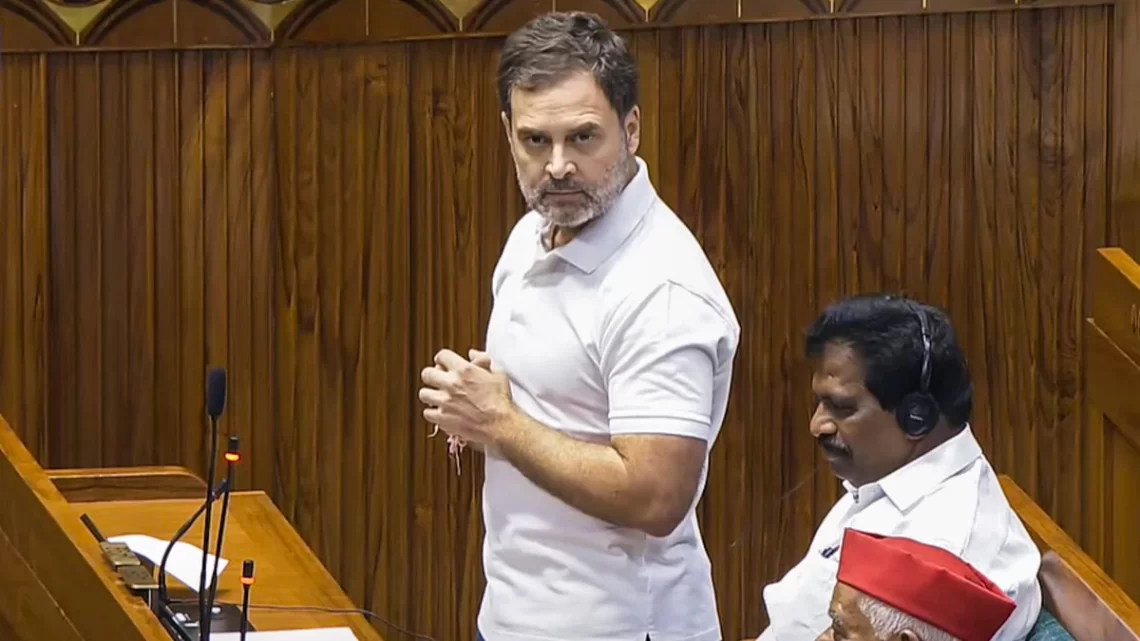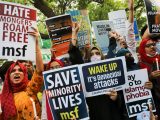
Rahul Gandhi’s Lok Sabha Speech Expunged Amid Criticism of Modi and BJP
July 3, 2024Indian opposition leader Rahul Gandhi’s speech in Lok Sabha was expunged by the Speaker, removing criticism of Prime Minister Narendra Modi, BJP, and RSS.
In his first speech as Leader of the Opposition in the Lok Sabha, Rahul Gandhi launched a scathing attack against the Indian government, Narendra Modi, and Hindu nationalist organizations, including both the BJP and RSS. He accused them of promoting hatred and violence.
Participating in the debate on the motion of thanks on the Indian President’s address, Gandhi criticized the Modi government on multiple issues, including the Agnipath scheme, NEET [National Eligibility cum Entrance Test] and UGC-NET [University Grants Commission-National Eligibility Test] irregularities, the farmers’ protest and MSP concerns, and the violence in Manipur.
He said that the ruling BJP was fostering an atmosphere of fear in the country and spreading violence and hatred against minorities, particularly Muslims, Christians, and Sikhs.
Rahul Gandhi’s remarks on the NEET exam, the Agniveer Scheme, industrialists Adani and Ambani, and his critique of Modi’s statements during election campaigns also faced expunction. Following the expunction, Rahul Gandhi wrote to Lok Sabha Speaker Om Birla, requesting the restoration of the expunged portions of his speech.
In his letter, he expressed shock at the removal of considerable portions of his speech. He emphasized that the expunged remarks included his criticism of the BJP for spreading hatred and violence while calling themselves Hindus.
Addressing reporters outside Parliament, Gandhi stated that expunging portions of his speech would not change the truth.
The expunction of Gandhi’s speech underscores the tension between the ruling BJP and the opposition. It highlights the challenges faced by opposition leaders in voicing their criticisms within the parliamentary framework.
Gandhi’s speech tackled various contentious issues, reflecting widespread public concerns. His critique of the Agnipath scheme and NEET irregularities pointed to perceived flaws in government policies affecting youth and education.
The farmers’ protest and MSP concerns were significant points of contention, with Gandhi accusing the government of neglecting farmers’ interests. The violence in Manipur was another critical issue, with Gandhi blaming the BJP for failing to maintain peace and order.
Gandhi’s references to industrialists Adani and Ambani were aimed at highlighting the alleged crony capitalism under Modi’s administration. His critique of Modi’s election campaign statements further underscored his argument that the BJP was fostering divisiveness.
The expunction of these remarks raises questions about parliamentary procedure and freedom of speech within India’s legislative framework. Gandhi’s letter to the Speaker reflects his discontent with the decision and his determination to have his criticisms heard.
Despite the expunction, Gandhi’s statements have resonated outside Parliament, drawing attention to the issues he raised. His assertion that expunging portions of his speech would not change the truth indicates his resolve to continue challenging the government’s policies and actions.
This incident highlights the ongoing political struggle between the BJP and the opposition, with significant implications for India’s democratic discourse. It underscores the need for robust debate and transparency in addressing the country’s critical issues.

